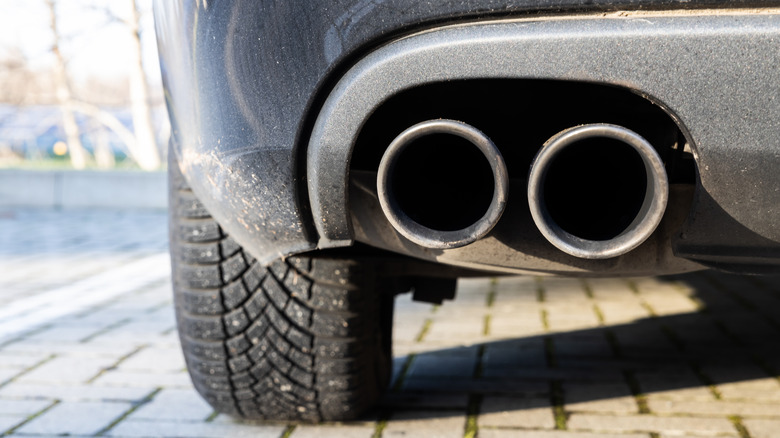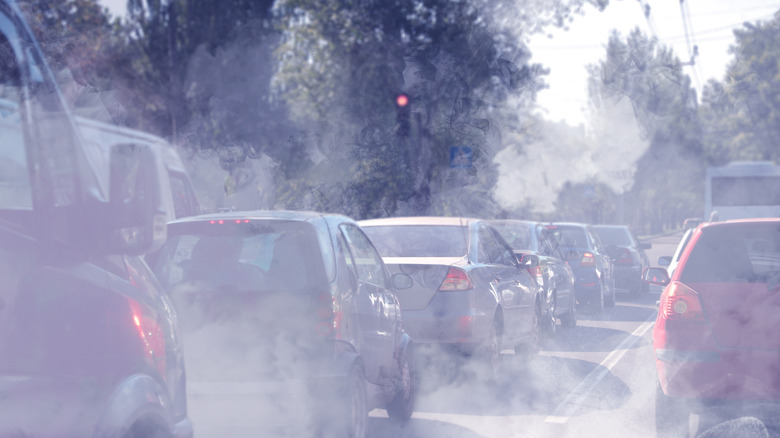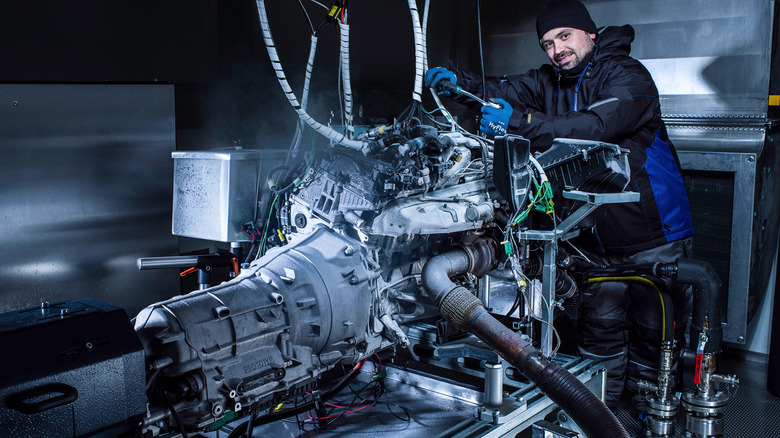Gasoline Vs. Diesel Engines: Which Pollutes More? It's Complicated
Named after Rudolf Diesel, who invented it in 1893, the diesel engine is often associated with a dirty, smoky exhaust — an admittedly nebulous impression in no small part fueled by the black clouds of smoke that often billow in the wake of our diesel-powered trucks and trains. Despite their reputation for higher efficiency and lower carbon emissions, diesel passenger cars never really caught on in the U.S. like they did in Europe. To be sure, diesel and turbodiesel can still satiate a new SUV owner's appetite for torque, but in 2025, the diesel power options are becoming fewer and farther between.
Not so long ago, diesel cars were promoted as an environmentally friendly solution. However, any promise of an upswing in diesel passenger vehicles in the U.S. was dealt a blow after a 2015 West Virginia University study: VW executives were forced to admit they were fudging emissions figures with software secretly fitted to half a million vehicles in the U.S., and 11 million worldwide. Confidence in diesel's green credentials took a massive hit, especially in the U.S.
Concern over engine pollution has been around as long as the engine itself. As science brings ever more damning evidence to the table, improvements to both gas and diesel engine design rise to meet the challenge. Of course the argument over which is cleaner still rages, but how meaningful is such debate in the light of the highly regulated environment in which car manufacturers operate today?
The Clean Air Act and the fight against pollution
The answer depends on where we put the goal posts, and how we keep score. If we compare like for like, burning a gallon of fuel in a diesel engine produces around 10% less carbon dioxide and greenhouse gas than a gallon of fuel in a gasoline-powered car. However, that score is not the final result: A diesel engine draws in more air than a gasoline engine, with the heat generated by compression igniting the fuel. Because air is 78% nitrogen, nitrogen oxides (NOx) form as a result, and those emissions are pollutants.
In 1970, the Clean Air Act set out a goal to reduce smog blanketing our cities, with later revisions targeting newly recognized problems like NOx, acid rain, the hole in the ozone layer, and global warming from greenhouse gases. Diesel particulate matter also came under the microscope after the World Health Organization declared diesel emissions carcinogenic to humans in 2012.
The invention of the catalytic converter and the diesel particulate filter (DPF) greatly assisted the EPA in its emission reduction targets, with DPFs mandatory on most diesel vehicles from 2009. Catalytic converters on gas engines have been around since 1976, when lead — which is damaging to both humans and catalytic converters — was banned in passenger car fuel. A 2017 EPA demand was made that refiners supply gas with 97% less sulfur than gas made in 2004, which also helped lower pollution emissions in all vehicles, both old and new.
With new, hi-tech engines, the differences are small
When choosing which vehicle best suits our needs, consumers should know that while more efficient, diesel vehicles are generally more polluting compared to gasoline engines. Age does matter: Older vehicles of either fuel type are the worst culprits, not only due to maintenance issues, but because they do not have the up-to-date pollution abatement technologies.
The precious metal coatings on a three-way catalytic converter can help gas engines put out 30% less nitrogen oxides (NOx) than diesel, breaking down toxic exhaust fumes into safer byproducts like water, nitrogen, and carbon dioxide. Meanwhile, in a diesel engine, a DPF works by trapping soot in its exhaust system before burning it to ash with increased exhaust temperatures. But these filters require maintenance, and urea-based mixtures like AdBlue need to be added to convert NOx gases to nitrogen and water.
However, a 2017 study from an international team published in the Scientific Reports journal showed a modern, DPF-fitted diesel car produces less carbonaceous particulate matter than a gasoline car. Commenting on the findings, Senior Research Fellow at the Institute for Transport Studies, University of Leeds — Dr Karl Ropkins — said the right combination of engine and abatement technology could significantly reduce emissions, regardless of fuel type. "A good diesel vehicle can be a clean vehicle, and a petrol vehicle can be a dirty vehicle," Dr Ropkins said.


